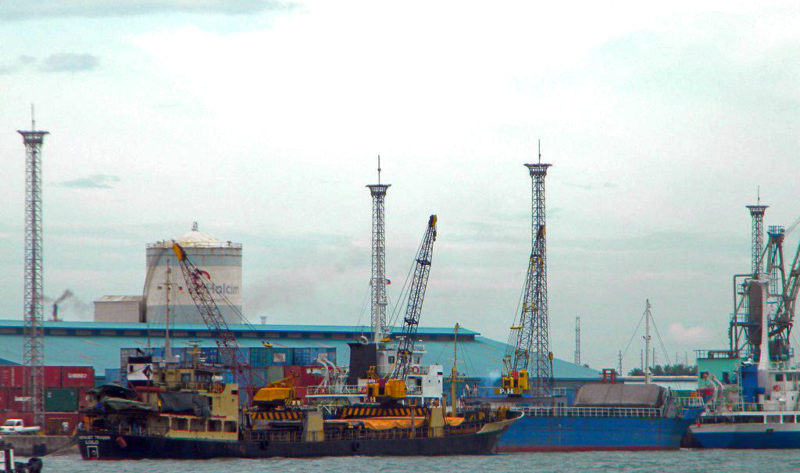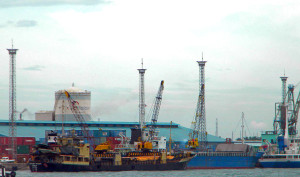

Domestic container lines in the Philippines are considering stopping their weekly operations at Loboc and San Pedro ports in Iloilo, 564 kilometers south of the capital Manila, unless authorities resolve the berthing problems there.
Philippine Liner Shipping Association (PLSA) chairman and president Sulficio Tagud, Jr., in a letter to the Philippine Ports Authority (PPA) dated June 4 and received by PPA on June 15, said its members “shall cease from calling thereat effective immediately upon advice sent to and accepted by the Maritime Industry Authority (MARINA).”
PLSA members have applied to MARINA to change their certificate of public convenience so they can eliminate Loboc and San Pedro from their ports of call.
The association said the planned pullout is “in view of the seeming failure of the port officials at Loboc Port and Port of San Pedro in Iloilo to address the complaints PLSA has raised regarding the unreasonable delays experienced by our members in the berthing of their vessels thereat.”
Member lines calling the two Iloilo ports include 2Go Group, Inc. (four calls weekly), Lorenzo Shipping Corp. (two calls weekly), Moreta Shipping Lines, Inc. (two calls weekly), Oceanic Container Lines, Inc. (two calls weekly), and Philippine Span Asia Carrier (three calls weekly).
”With our members continuously experiencing unnecessary delays in berthing at Iloilo ports, additional and unnecessary costs are incurred by the shipping lines, thus, calling at said ports may prove to be impractical and no longer feasible,” PLSA said.
The group said San Pedro is an ideal call for liner vessels carrying passenger and roll-on/roll-off cargoes because it is close to Iloilo City. However, the San Pedro port is in urgent need of dredging, as its shallow depth prevents cargo vessels from docking, making liners prefer Loboc port instead, PLSA noted.
At San Pedro port as well, “liner cargo vessels have to compete with trampers to use the same port despite the priority in berthing that should be accorded to liner vessels.”
As for Loboc Port, PLSA said its member-lines experience long delays in berthing “due to the re-bagging operations being done by foreign vessels docked at the pier, hence, their very long berth stay thereat forcing our members’ vessels to queue.”
Domestic liners calling Iloilo ports discharge cargo in containers, while foreign vessels discharge bulk and breakbulk cargoes.
PLSA noted that queuing can take from two to seven days, causing member lines to “incur additional fuel expense, lost revenue opportunity, and insurance costs due to claims filed by disgruntled Iloilo shippers whose cargoes were not delivered on time.”
The situation at the Iloilo ports has been a concern among PLSA members since last year. The association said it had raised the issue during the Port Management Advisory Council meeting held on March 25 presided by Panay/Guimaras port manager Rosenda Sumagaysay, who oversees Iloilo ports.
Unless PPA conducts a berth rationalization study on “proportionately allocating berth at the Port of Loboc based on the frequency of vessel calls of both domestic liners and foreign shipping lines, our member-companies will have second thoughts on resuming their vessel calls at the said ports,” PLSA said.
Based on the regularity of their port calls, the association said two berths should be allocated for domestic cargo liners, “as they will no longer be compelled to queue at anchorage to wait until foreign vessels finish their re-bagging operations.”
PLSA said PPA Iloilo determines the length of port stay of domestic cargo vessels based on the volume of containers to be discharged, but does not do the same for foreign vessels. The association said PPA should factor foreign vessels in the equation in order to discourage or disallow re-bagging at dockside.
A PPA official who did not want to be named told PortCalls on June 18 that the berthing problem is a result of growing cargo volume and vessel calls in Iloilo which started to increase two years ago, due to the area’s flourishing economy.
For the first quarter of 2015, Iloilo recorded 833,972 metric tons of cargo, broken down into 732,134 mt of domestic cargo and 101,838 mt of foreign. The total is 12.2% higher than the 743,059 mt registered in the same period last year.
Port improvements in Iloilo are continuous, the PPA source said, including a 100-meter berth extension, dredging, and allocation of a re-bagging facility by the cargo-handling operator.
A PLSA member line later told PortCalls the berth extension is not enough to substantially improve port conditions. In addition, they have yet to see a re-bagging facility.
The PPA source admitted solutions to the berthing issue are temporary, and that there are as yet no long term-plans to address the growing volume.
PPA commercial services department manager Emma Suzara, in a text message to PortCalls, said “the problem at ICPCI (Iloilo Commercial Port Complex) is being resolved by the port manager there.”
PPA assistant general manager Raul Santos, in an earlier chance interview with PortCalls, said the agency is conducting a feasibility study on improvements required by ports in the country where domestic liners call after loading cargoes from Manila North Harbor. Santos did not give further details as the study is still ongoing.
PPA’s Sumagaysay had asked for a meeting with PLSA on June 19 in Iloilo. During that meeting PLSA said PPA only proposed “band-aid” solutions.
In the meantime, PLSA will request PPA for specifications of ports near Loboc to help member liners decide on alternative calls should they decide to skip Loboc and San Pedro ports. – Roumina Pablo




